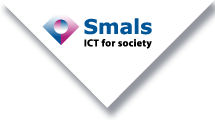
NEDERLANDS
De afgelopen twee jaar schoten blockchainprojecten wereldwijd als paddenstoelen uit de grond. Ondertussen is de hype wat gaan liggen en kunnen we een balans opmaken. Smals Research werkte bovendien zelf concreet met de technologie in een realistische setting. Wat zijn daarbij onze bevindingen? Welke andere opvallende projecten werden binnen en buiten België opgezet en welke lessen kunnen we daaruit trekken? Deze infosessie geeft een zicht op de stand van zaken anno 2018.
De verwachtingen in de technologie zijn nog steeds enorm. Toch staan tussen droom en daad wetten en praktische bezwaren. Hoe zit het bijvoorbeeld met de GDPR en privacy? En wat met schaalbaarheid? Ondanks de vele open vragen kunnen vandaag reeds een aantal cruciale aspecten uitgeklaard worden.
Ook Smals Research is aan de slag gegaan met de technologie en ontwikkelde een werkende proof of concept. We hielden daarbij rekening met diverse aspecten die bij blockchainprojecten te vaak over het hoofd worden gezien. Tijdens de infosessie hoort u alles over onze aanpak en bevindingen.
Was u in maart 2017 erbij tijdens onze infosessie over blockchain en smart contracts? Deze infosessie is geen herhaling van de vorige! De focus lag toen op technologische principes. Dit keer nemen we concrete ervaringen en resultaten onder de loep.
Wat krijgt u te zien in deze infosessie?
- Een beknopte introductie tot blockchain en smart contracts
- Een aantal blockchainprojecten uit binnen- en buitenland en de lessons learned
- De blockchainstrategie van Smals Research
- Een concreet door Smals Research uitgewerkt blockchainproject
- Een aantal spanningsvelden tussen blockchaintechnologie en de realiteit, waaronder privacy
FRANCAIS
Ces deux dernières années, les projets blockchain ont poussé comme des champignons à travers le monde. L’engouement s’est estompé depuis et nous pouvons maintenant dresser le bilan. L'équipe Smals Research a en outre elle-même employé la technologie dans un contexte réaliste. Quelles sont nos constatations ? Quels autres projets marquants ont vu le jour en Belgique et à l'étranger et quelles leçons pouvons-nous en tirer ? Cette séance d'info a pour but de faire le point de l'année 2018.
Les attentes vis-à-vis de la technologie sont toujours énormes. Il n'en reste pas moins que des lois et des contraintes pratiques séparent le rêve de la réalité. Qu'en est-il par exemple du RGPD et de la vie privée ? Et quid de l'extensibilité ? Même si les questions ouvertes sont nombreuses, plusieurs aspects cruciaux peuvent aujourd'hui être clarifiés.
Smals Research s’est elle aussi lancée dans la technologie et a développé une preuve de concept opérationnelle. Nous avons ici tenu compte de divers aspects trop souvent négligés dans les projets blockchain. Lors de la séance d’info, vous découvrirez tout sur notre approche et nos constats.
Vous avez assisté à notre séance d’info de mars 2017 consacrée à la blockchain et aux smart contracts ? Cette séance d'info n'est pas une réédition de la précédente ! La précédente séance était axée sur les principes technologiques. Cette fois, nous examinerons des expériences et des résultats concrets.
Que vous réserve cette séance d’info ?
- Une introduction succincte à la blockchain et aux smart contracts.
- Divers projets blockchain belges et étrangers ainsi que les leçons retenues.
- La stratégie blockchain de Smals Research.
- Un projet blockchain concrètement élaboré par Smals Research.
- Un aperçu des facteurs de tension entre la technologie blockchain et la réalité, tels que la vie privée.






